- Author Jason Gerald gerald@how-what-advice.com.
- Public 2023-12-16 10:50.
- Last modified 2025-01-23 12:04.
Tinnitus is a condition characterized by a ringing or buzzing sound in the ear. Causes of tinnitus include exposure to loud noises, earwax, heart or blood vessel problems, prescription medications, and thyroid disease. To get an accurate diagnosis, visit a doctor and develop a treatment plan. In most cases, tinnitus cannot be eliminated, but there are ways to reduce its intensity. You can use sound generators, hearing aids, and medication to help reduce noise in your ear. Research on tinnitus is constantly evolving, and you can try experimental therapies.
Step
Method 1 of 3: Reducing Tinnitus Symptoms

Step 1. Disguise the hum and rumble with a sound generator
The sound generator will drown out the hum and rumble with white noise, soothing sounds, or soft music. You can choose a small in-ear device, headphones, or a white noise machine. In addition, you can also use household items, such as air conditioners, air purifiers, fans, or televisions at low volume.
- Although it can't cure tinnitus, sound therapy will reduce symptoms, improve concentration, and make it easier to sleep.
- Medical grade sound therapy is sometimes expensive and is not covered by insurance. If you want a more affordable solution, look for nature sounds or soothing soft music that you can play alone.
- Neutral and stable sounds, such as white noise that sounds “shhh” are more effective than sounds of varying intensity, such as waves.
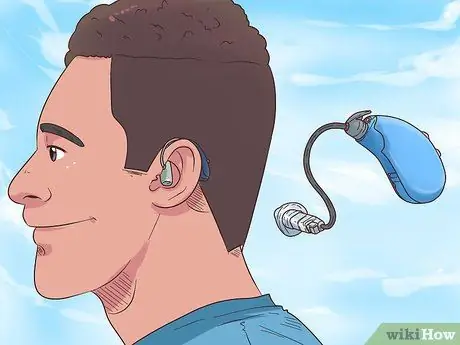
Step 2. Treat hearing loss and disguise the tinnitus with hearing aids
If your hearing is impaired, hearing aids can mask the buzzing or rumbling sound by increasing the volume of external sounds. Ask your doctor to refer you to an audiologist or ENT specialist. They can help select and match hearing aids.
- If your hearing isn't compromised, you can still use a hearing aid or implant to stimulate the auditory nerve, or disguise buzzing and rumbling with white noise.
- Even though hearing aids are expensive, most insurers are willing to cover them.
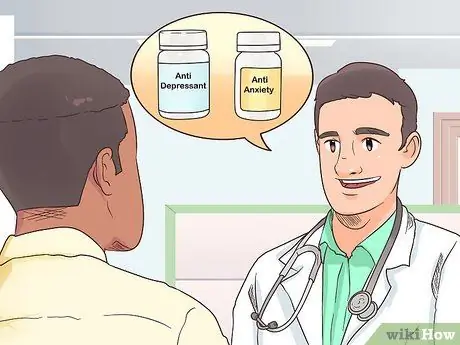
Step 3. Discuss the use of anti-anxiety and antidepressant medications with your doctor
Psychoactive drugs can reduce the intensity of symptoms, reduce insomnia associated with tinnitus, and help manage it. The drug is effective for serious cases of tinnitus that triggers stress, anxiety, and depression.
- Stress, anxiety, and depression can make tinnitus worse. Emotions and tinnitus are related, or trigger and exacerbate each other. If you experience this circular effect, your doctor may suggest taking anti-anxiety medications or antidepressants.
- Anti-anxiety drugs and antidepressants can cause unwanted side effects, such as blurred vision, dry mouth, nausea, constipation, irritability, and decreased sex drive. Tell your doctor if you experience any new or unusual side effects or symptoms, such as depression, suicidal thoughts, or aggressive urges.
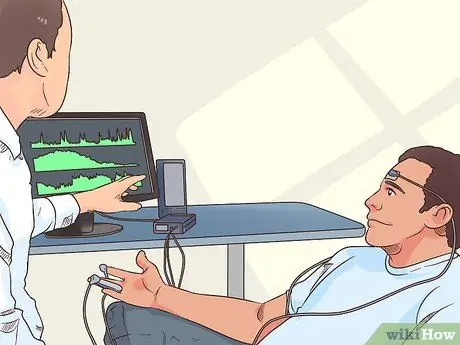
Step 4. Find a counselor with experience in tinnitus management
A therapist can help you deal with tinnitus and its impact on quality of life. Therapy is usually followed by other treatments, such as medication or sound therapy.
Look for experienced counselors and other ENT health specialists through information from general practitioners or the internet
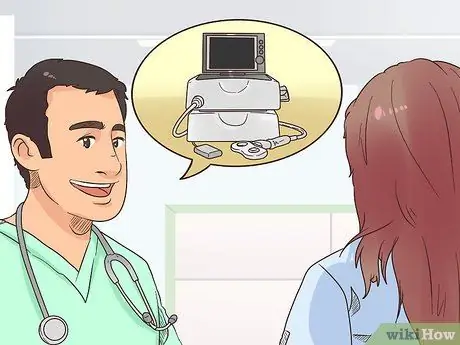
Step 5. Ask your doctor about experimental therapies
There is currently no treatment that can cure tinnitus, but research continues. So, try some experimental therapies. Electronic and magnetic stimulation of the brain and nerves may correct the overactive nerve signals that cause tinnitus. This technique is still under development. So ask your doctor or hearing expert if you want to give it a try.
In the future, there may be new drugs. So, ask your doctor or ENT specialist to provide you with information about new therapies
Method 2 of 3: Coping with Tinnitus with Lifestyle Changes
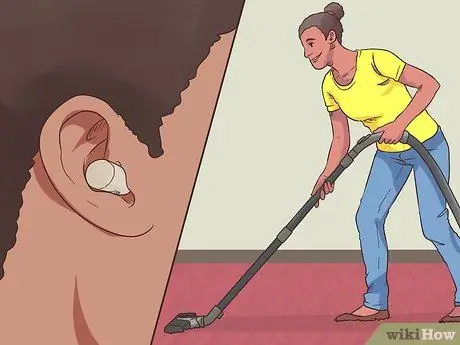
Step 1. Limit exposure to loud noises
Loud noises can trigger and worsen tinnitus. Wear earplugs if you work in a noisy environment, when using loud power tools, mowing the lawn with a machine, vacuuming, or performing other noisy tasks.

Step 2. Exercise at least 30 minutes a day
Cardiovascular exercise is helpful, such as walking, running, cycling, or swimming. Apart from being beneficial for overall health, exercise also improves blood flow, to help reduce tinnitus associated with heart or blood circulation problems.
- An active lifestyle is also great for emotional health.
- If you're not used to exercising, talk to your doctor before starting a new exercise program, especially if you have a certain medical history.

Step 3. Try meditation and relaxation techniques
Stress can make tinnitus worse. So take a deep breath and relax if you start to get anxious, worried, or overwhelmed. Inhale for a count of 4, hold for a count of 4, then exhale for a count of 4. Continue to control your breath like this for 1 to 2 minutes until you calm down.
- Visualize a place that relaxes while breathing, such as the beach or a soothing childhood memory.
- Try to avoid situations and people that cause stress. If you have multiple tasks, don't take on new responsibilities or do many things at once.
- Take a yoga or martial arts class to practice sensitivity and relaxation. Activities in the classroom are a social component that can improve the overall mindset.

Step 4. Avoid caffeine, alcohol, and nicotine
Try to quit smoking and limit your consumption of caffeinated coffee and tea, soft drinks, and chocolate. These substances can affect blood flow and make tinnitus worse. Nicotine is very dangerous. So, ask your doctor for advice to stop using tobacco, if necessary.
Avoiding caffeine also helps if you have trouble sleeping because of tinnitus
Method 3 of 3: Treating the Underlying Condition of Tinnitus
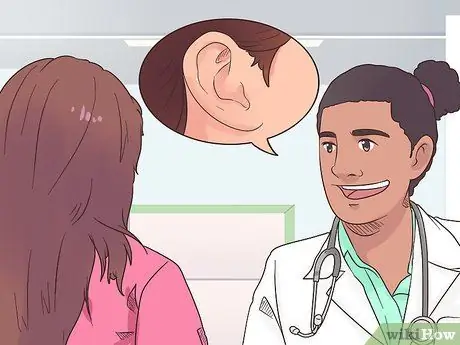
Step 1. Visit a doctor for an accurate diagnosis
Tinnitus is characterized by a buzzing or rumbling sound in the ear. However, the noise is a symptom, not the actual disease. So, schedule a check-up with your doctor. The doctor will perform a physical examination and test your hearing.
Tinnitus can be caused by exposure to noise, earwax, heart or blood vessel problems, prescription medications, and thyroid disorders
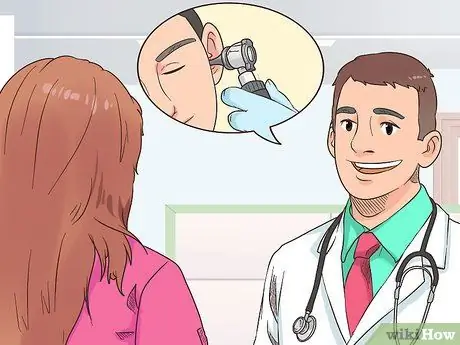
Step 2. Ask for referrals if necessary
You can have your tinnitus checked by a GP, but you may be referred to an audiologist who is a hearing specialist or ENT specialist. Specialists are better trained to develop a tinnitus treatment plan.
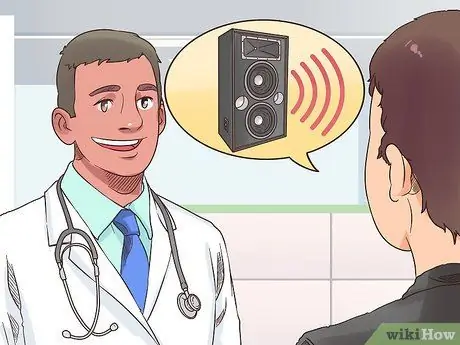
Step 3. Tell your doctor if you are frequently exposed to noise
Hearing loss caused by noise is a major cause of tinnitus. Your risk of developing tinnitus is higher if you are a musician, work in a factory or construction site, use machinery, attend concerts frequently, or have heard loud explosions.
Based on this information, your doctor can determine what is causing your condition
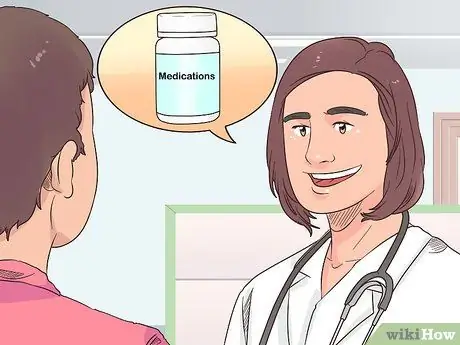
Step 4. Discuss what medications you are taking with your doctor
There are more than 200 medications that are known to cause or worsen tinnitus. Examples are some types of antibiotics, cancer drugs, antimalarial drugs, and diuretics. If you are taking a drug that belongs to that class, ask if you should reduce your dose or use an alternative with lesser side effects.
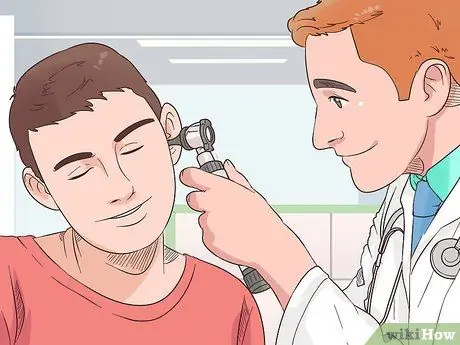
Step 5. Ask the doctor to irrigate the ear if there is blockage due to dirt
Dirt can block the ear canal and cause irritation, irritation, and tinnitus. If necessary, have your doctor irrigate your ear with medicated liquid or a special suction device.
- Do not irrigate your own ear without consulting your doctor. You can try home remedies, such as adding baby oil or hydrogen peroxide with a dropper. However, only do so if your doctor has allowed you to.
- Do not clean the ear with a cotton swab because it can irritate the ear and push the wax further in.
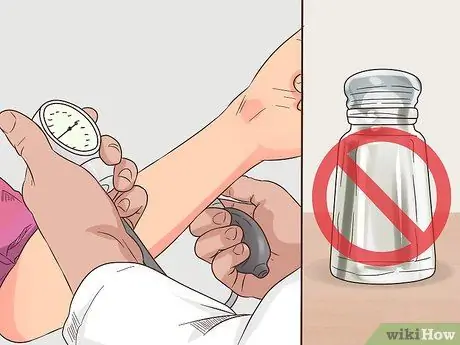
Step 6. Treat blood pressure or blood vessel problems, if necessary
Your doctor will prescribe medication for tinnitus associated with high blood pressure or other circulation problems. Take your medication as directed, and ask your doctor if you need to make any dietary or lifestyle changes.
For example, maybe you need to limit your salt intake. Use dried or fresh herbs instead of salt when cooking, avoid salty snacks, and don't add salt to food. Your doctor may also suggest reducing fat intake and exercising more often
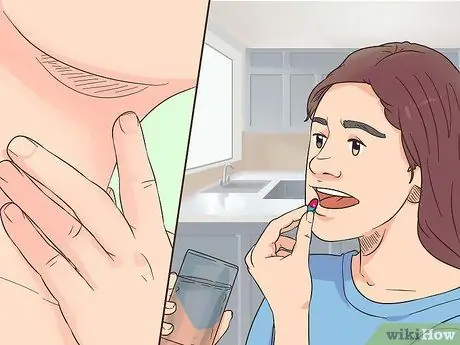
Step 7. Take medication for thyroid disorders, if necessary
Tinnitus is sometimes associated with hyperthyroidism and hypothyroidism. The doctor will check for swelling or lumps in the thyroid gland in the throat, and perform blood tests to test its function. If there are problems, you will be prescribed medication to regulate thyroid hormone levels.






